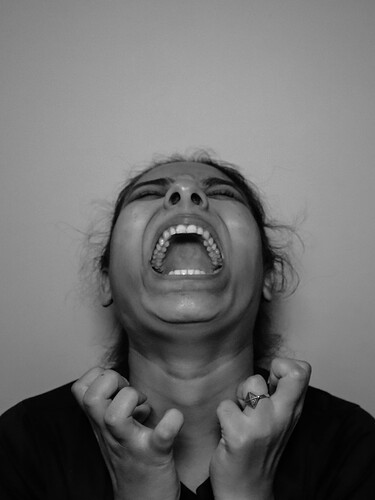I remember this night like it was yesterday.
Our long-term inpatient group got to stop at Denny’s after choir practice. It was late, we were tired, but the energy was good—15 of us packed into a side room, laughing, eating, just… living. For the first time in a long time, it felt like maybe this recovery thing could actually work. Like maybe we weren’t all doomed to fall apart.
Then it hit me—fast, violent, like a slap to the face.
“Vomit. You have to vomit. Now.”
My body changed in an instant. My legs felt enormous, my stomach spilled over my waistband, my face felt swollen and distorted like it had doubled in size. The distortion was real in my mind. My brain was screaming and there was no reasoning with it.
“Vomit. You have to vomit NOW.”
It had been seven months since I started recovery from my eating disorder. I’d been doing okay. A few slip-ups with laxatives, some obsessive thoughts about food and exercise, but overall I was holding on.
Until that night.
The voice wouldn’t stop. It was relentless and cruel. I looked around at everyone enjoying their food, and then at my own empty plate—and I felt disgusting. Like I didn’t deserve to be sitting there.
“Vomit. You HAVE to vomit.”
If you’ve ever lived with an eating disorder, you know the high that comes after a purge. It’s horrible to admit, but it’s true—it’s like a drug. The anxiety, the noise, the chaos in your brain—gone, just like that. It convinces you it’s harmless: just this once, just this meal, and the suffering will fade.
That’s the lie bulimia tells you. And it works, until it doesn’t.
The high after the purge, the thrill when your jeans fit looser—it makes you forget the shame. The obsession. The physical damage. The soul-crushing isolation.
Recovering from addiction and an eating disorder at the same time? It’s a special kind of hell. For me, meth was the solution. When I was high, I wasn’t hungry. I didn’t need to purge. I was skinny, and that felt like winning.
When I got sober, I gained weight—and that was the hardest part. Not the trauma work, not the cravings. Learning to live in my body, with my body, was the hardest. Loving myself felt impossible when I hated what I saw in the mirror.
That night, I broke down. I was sweating, panicking, gasping for air behind a dumpster outside a grimy Denny’s. On my way out, I locked eyes with a friend who immediately knew. She recognized it—because she’d been there too.
She found me behind that dumpster, curled up, shaking, sobbing, saying “I can’t, I can’t, I can’t.” She didn’t try to fix me—she just held me. She hugged me until my breathing slowed, until the screams turned into silence. She knew how easily one purge could set me back months. She knew how much strength it would take not to.
I remember thinking—if I had to pee in that moment, it was going to happen right there behind the dumpster. (If you know, you know.)
But eventually, the moment passed. My breath returned. My brain shifted out of crisis. And I didn’t purge.
That’s the thing people don’t always get—purging takes no effort. No tools. No money. You don’t have to go find anything or plan it out. It’s right there, easy and immediate. But resisting? That takes everything.
The amount of strength it takes to battle your own brain, your body, and every screaming urge inside you every single day is unbelievable.
I don’t even know what I’m trying to say. Maybe I’m just realizing how far I’ve come. Because when you’re battling both addiction and an eating disorder, the pain compounds. It doesn’t mean others aren’t struggling too—it just means our struggle is… layered. Messy. Confusing. Devastating in a specific way.
And recovery? It’s possible.
It’s slow, ugly, raw, but so damn worth it. Every single battle you win against your brain is proof you’re still in the fight. And that fight matters.
You matter.
